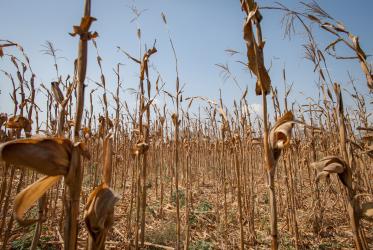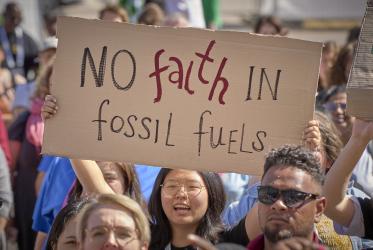to be adopted at the Follow-up International Conference on Financing for Development to Review the Monterrey Consensus, Doha, Qatar, 29 November-02 December 2008
The Time for Justice is Now
Justice continues to be at the heart of the matter
In line with its commitment to public witness for global justice and peace, the World Council of Churches (WCC), through an ecumenical team, had closely followed the United Nations' (UN) 1st International Conference on Financing for Development (FfD) that produced the 2002 Monterrey Consensus. The WCC statement on the occasion of the 1st FfD Conference, entitled "Justice is at the heart of the matter", had critiqued the Monterrey Consensus for failing to redress systemic imbalances in international trade, financial and monetary systems as well as for continuing to endorse neo-liberal economic policies that have resulted in worsening inequality as well as wrought human rights violations and ecological destruction in many countries in the developing world.
Revisiting the neoliberal development paradigm
Nearly six years after Monterrey, and against an increasingly precarious global context characterised by unparalleled financial, food and climate crises, the UN has convened the Follow-up International Conference on FfD to Review the Monterrey Consensus from 29 November to 02 December 2008 in Doha, Qatar.
The triple crises confronting our world today serve as a scathing indictment of the neo-liberal development paradigm and its failure to support internationally agreed goals articulated in the Monterrey Consensus as well as in many other UN conferences, namely: sustainable development, poverty eradication and gender equality. Motivated, at core, by greed - that is: a thirst for maximum private returns in the shortest possible time - the neo-liberal model has pushed our world closer to the brink of financial and ecological breakdown. The WCC is particularly concerned about the crises' unfolding impacts on the lives and livelihoods of the economically weak and vulnerable. While they had little or no part in the creation of these crises, poor countries and people in poverty - already struggling to make daily ends meet - are paying the highest price for reckless economic liberalisation and deregulation.
The Follow-up International Conference on FfD provides a historic opportunity for world leaders to take responsibility and enact transformations towards building an equitable and sustainable global economic system that meets the economic, social and cultural rights of all, women and men, and nurtures the environment. Now more than ever, radical changes and tangible commitments are needed.
Notwithstanding the above, the WCC observes that the Doha Outcome Document remains largely uncritical of the neo-liberal paradigm. Nor does the document proffer deep-seated changes in our trading, financial and monetary systems, binding obligations or concrete timelines. Like the Monterrey Consensus before it, the Doha Outcome Document is in danger of falling drastically short of generating effective and timely responses to the global crises of our times.
Building an equitable international financial architecture
The ongoing global financial meltdown bears out the WCC's earlier concern, stated in its 2002 statement on the Monterrey Consensus, over the lack of "explicit [ ] control of financial markets". The WCC had pointed out that financial liberalisation "exposes economies with weak financial infrastructures to the speculative forces of world financial markets, shaking their socio-economic integrity to breaking point".
Emanating from the U.S. economy and spreading to Europe, the current financial turmoil now threatens to spill over to poor countries through declines in government revenues, domestic and foreign investments, migrant remittances, and official development assistance (ODA), which, in turn, could result in economic contraction and massive unemployment. With the gradual dismantling of social safety nets under pressure from the Bretton Woods institutions (BWIs), people in poverty are left to fend for themselves. Furthermore, in the prevailing environment of uncertainty, prior pledges of international and bilateral financial support for addressing the food crisis and climate change mitigation and adaptation in poor countries are in peril of being reneged on.
The estimated USD three trillion taxpayer's bailout of U.S. and European banks, insurance and investment companies (equivalent to many times the amount of resources needed to meet the Millennium Development Goals) as well as the continuing problems of external debt and capital flight hounding poor countries make exceedingly clear that the present international financial system is not merely inefficient. It is a system based on injustice, whereby the global poor are essentially subsidising the rich.
Nothing less than a paradigm shift is called for. It is worrisome, therefore, that the Doha Outcome Document has not come close enough to laying the foundations for a new system of international financial governance that overcomes existing inequities and addresses current and future challenges. While the document applauds efforts to boost the voting power of developing countries within the BWIs, it does not specify a timeline for implementation. More importantly, it offers little in terms of rebuilding international, regional, and national financial and monetary institutions with the objectives of ensuring stability and enabling development through monitoring, coordination, supervision and the provision of immediate liquidity, without restrictive conditions, to developing countries made vulnerable to crises.
In this regard, the WCC urges the UN to take leadership in redesigning an international financial architecture that establishes a global system of regulation as well as enlarges the space for developing country governments to enhance social protection in crisis periods. Some of the specific characteristics of such a system would be:
-
systematic supervision of international capital flows, especially volatile short-term capital flows, via international, regional and national capital controls including taxation;
-
introduction of international regulatory mechanisms and greater transparency in the management of new financial products and innovative financial instruments;
-
counter-cyclical economic policies, especially enhanced public spending on rural development and social services in support of social reproduction; and
-
expanded social control of core banking sectors.
Furthermore, the WCC continues to call for a lasting solution to the debt problem for poor and middle-income countries beginning with the unconditional cancellation of the illegitimate debts being claimed from poor countries - this would immediately free up resources for social protection, rural development and climate change mitigation and adaptation - as well as the setting up of an independent and fair debt arbitration mechanism, under UN auspices, for current and future loans to promote ethical lending and borrowing.
Ending hunger and sustaining livelihoods
In 2002, the WCC statement on the Monterrey Consensus had decried the lack of explicit "promotion of equity and human rights as factors in world trade". This remains excruciatingly relevant as demonstrated by the upward spiral in international food prices, particularly in the first half of 2008, which has deepened hunger for close to one billion people (nine out of ten of who inhabit the developing world).
While triggered by rising energy costs, the expansion of bio-fuels and heightened speculation in commodities, among other factors, the global food crisis has its roots in neo-liberal reforms in trade and investment regimes that had been pushed by the BWIs and the World Trade Organisation (WTO) as well as legitimised by the Monterrey Consensus. In particular, the indiscriminate lowering of trade barriers over the last two decades had exposed farmers in poor countries to surges of subsidised imports from rich nations, wiping out millions of rural livelihoods and undermining incomes for small food producers (majority of who are women). The promotion of large-scale, mono-cultural, export-oriented agriculture also helped to consolidate the grip of trans-national agri-businesses over the supply, retail and trade of seeds, fertilisers, and other agricultural inputs. The overall result: seven out of ten developing countries are net food importers, with rising food import bills contributing to widening trade deficits.
Dominated by rich country governments and corporate interests, the Doha Round of trade negotiations at the WTO have failed to resolve issues around trade in agriculture as well as in other areas, and have since collapsed. While the Doha Outcome Document calls for a resumption of trade talks, it does not seriously tackle the underlying reasons for the breakdown, including rich countries' reluctance to commit to time frames for eliminating agricultural subsidies and unfair pressurising of poor countries to further liberalise their industrial and services sectors in exchange for concessions in agriculture.
In this context, the WCC continues to call for the removal of structural inequalities in the global trade system and the establishment of mutuality, transparency and civil society (not least women's) participation in future negotiations. More specifically, the WCC urges the UN, BWIs, and WTO to redesign trade and investment regimes, laws and rules at global, regional and national levels in line with upholding human rights (not least the right to food) and promoting sustainable livelihoods. This requires, among others, measures, with accompanying timelines for implementation, that:
-
protect local producers from subsidised imports;
-
guarantee fair and stable commodity prices;
-
promote technology transfer;
-
introduce competition regulation of trans-national corporations; and
-
ensure corporate social responsibility and accountability, especially adherence to internationally agreed conventions on upholding human rights, decent work, and environmental protection.
Addressing ecological debt
The financial implications of climate change were little understood in 2002 and did not figure in the Monterrey Consensus. Today there is widespread acknowledgement that climate change necessitates urgent mitigation and adaptation measures estimated by the UN to cost as much as USD 100 billion and USD 28-67 billion per annum, respectively, by the year 2030. While climate change impacts, such as rising sea levels, droughts, floods and massive storms, threaten food and water security, human and all life, these effects will be unevenly distributed among countries and social classes. Poor countries and poor people will be hardest hit although they contribute least to greenhouse gas (GHG) emissions that are known to cause global warming. Carbon-intensive production and consumption patterns in rich, industrialised countries - and among the rich stratum in poor countries - are the main culprits behind climate change, generating what is called a tremendous ecological debt towards poor countries and people as well as the earth.
It is laudable that the Doha Outcome Document recognises that low-income countries require capital and technology transfer for climate change mitigation and adaptation. However, the document falls short of proposing new, additional, innovative, and non-debt-creating means of mobilising climate change finance.
In this light, the WCC urges the UN to conceive a just and sustainable climate change financing framework that redistributes the financial outlays for mitigation and adaptation among and within countries in proportion to their contribution to climate change and according to their capacity to pay. Rich, industrialised countries do not only have a historic responsibility to curb their GHG emissions, they also have an ethical and moral obligation to pay for the ecological damages they have inflicted on poor countries through their disproportionate appropriation of natural resources and unsustainable lifestyles. The WCC urges rich, industrialised countries to provide compensatory and reparative finance to fund climate change mitigation and adaptation efforts in poor countries. These monies must be over and beyond ODA which are intended to finance other development objectives. The WCC further supports the development of an international tax regime that levies a tax on over-consumption of natural resources.



